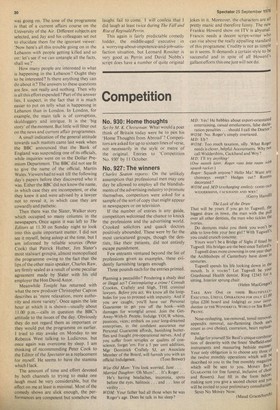Television
Won't do
Richard Ingrams
Continuing my investigation of tile issues raised by Peter Jay and John Birt I find myself concluding that whatever else the telly will do, it will not tell you what is going on, except at a very inconvenient time of the day. The kind of store which London Weekend sets on news reporting is shown by the fact that the Jay-Birt programme Weekend World goes out at twelve o'clock on a Sunday morning. It is quite contrary to my religious beliefs to watch television on a Sunday morning but I have twice now witnessed a chunk of Weekend World before dashing off to drinks with the neighbours.
The first time it was about South Africa and the second time, the Lebanon. In both cases there seemed to be a worthy and public-spirited concern to find out what was going on. The tone of the programme is that of a current affairs course on the University of the Air. Different subjects are selected, and Jay and his colleagues set out to elucidate them for the ignorant viewer: 'Now here's all this trouble going on in the Lebanon with people getting killed and so on: let's see if we can untangle all the facts, shall we?'
How many people are interested in what is happening in the Lebanon ? Ought they to be interested? Is there anything they can do about it ? The answers to these questions are few, not really and nothing. Then why is all this effort expended ? Part of the answer lies, I suspect, in the fact that it is much easier to put on telly what is happening in Lebanon than in London. In London. for example, the main talk is of corruption, skulduggery and intrigue. It is the 'big story' of the moment. But little will filter out on the news and current affair programmes.
A small indication of the general attitude towards such matters came last week when the BBC announced that the Bank of England was suspending one of its officials, while inquiries went on in the Dollar Premium Department. The BBC did not see fit to give the name of the official, Martin Wales. Viewers had to wait till the following day's papers before they discovered who it was. Either the BBC did not know the name, in which case they are incompetent, or else they knew it and were advised by a lawyer not to reveal it, in which case they are cowardly and pathetic.
Then there was the Slater, Walker story which occupied so many columns in the newspapers. Once again it was left to The Editors at 11.30 on Sunday night to look into this quite important matter. I did not see it myself, being asleep at the time, but I am informed by reliable sources (Peter Cook) that Patrick Hutber, Jim Slater's most stalwart groupie, almost monopolised the programme owing to the fact that the lips of the other main speaker, Charles Raw, are firmly sealed as a result of some peculiar agreement made by Slater with his old employer the Hon David Astor.
Meanwhile Tonight has returned with what the new producer Christopher Capron describes as 'more relaxation, more authority and more variety'. Once again the late hour at which it is shown—usually about 11.00 p.m.—calls in question the BBC's attitude to the issues of the day. Obviously they do not regard them as important or they would put the programme on earlier. I tried to stay awake on Monday to see Rebecca West talking to Ludicrous. but once again was overcome by sleep. I am thinking of recommending Peter Cook to the Editor of the Spectator as a replacement for myself. He seems to have the stamina which I lack.
The amount of time and effort devoted by both channels to trying to make one laugh must be very considerable, but the effect on me at least is minimal. Most of the comedy shows are slick enough, the performances are competent but somehow the
laughs fail to come. I will confess that I did laugh at least twice during The Fall and Rise of Reginald Perrin.
This again is fairly predictable comedy fodder, the middle-aged executive in a worrying-about-impotence-and-job-satisfaction situation, but Leonard Rossiter is very good as Perrin and David Nobbs's script does have a number of quite original
jokes in it. Moreover, the characters are all pretty manic and therefore funny. The new Frankie Howerd show on ITV is abysmal. Francis needs a decent script-writer who can rise above the really appalling standard of this programme. Crudity is not as simple as it seems. It demands a certain style to be successful and in spite of all Howerd's gallant efforts this one just will not do.



































 Previous page
Previous page